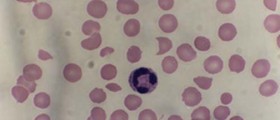
Neutropenia
Neutropenia in children is a condition in which the numberof neutropenia leukocytes reduces. The white blood cells are very important forour body as they defend our immune system from all sorts of infections. There are manyinfections that our children are surrounded by and white leukocyte help in destroyingthat harmful bacteria. If the number of neutropenia leukocytes is smaller thannormal, it automatically means that our child has more chances to become infectedby bacteria.
Causes of Neutropenia in Children
Causes that can lead to neutropenia are known and there aren't many of them. One of the causes is genetics and it can occur without anyobvious reason, causing the temporarily fall of white cell blood count. Periodof a few months is required, so that the white blood cells return to normal.This presents a very mild form of neutropenia and it doesn’t endanger the child’shealth.
Causes of neutropenia in children include diseases such as autoimmunediseases that have an impact on all the blood cells, and vitamin B deficiency. Achild that is on chemotherapy for some other condition such as cancer has a greatpossibility to develop neutropenia. Infections that include tuberculosis and acondition of a bone marrow disorders are also the causes of neutropenia inchildren.
Chronic neutropenia in children is considered when a childhas a low number of white blood cells for more than three months. Chronicneutropenia appears in four forms: congenial (by birth), cyclic (a blooddisorder), idiopathic, and autoimmune neutropenia. Autoimmune neutropenia isvery common among infants and young children and a period of two years oftreatment is necessary to beat that disease.
A common symptom for neutropenia in children includesweakened immune system, which becomes liable to all sorts of infections. So, it isimportant to monitor the condition of your child and the state of it.
Treatment of Neutropenia in Children
In the cases of mild neutropenia, the treatment isn’t necessary.The treatment usually depends on the stage and the difficulty of the case. Ifthe condition of a child is really poor, a doctor may treat it with neutrophilgrowth factor injections. If you, as a parent, notice that your child is developinginfections often, and is always treated from some bacterial infection, it wouldbe good to visit a pediatrician for a close examination.
















Your thoughts on this
Loading...